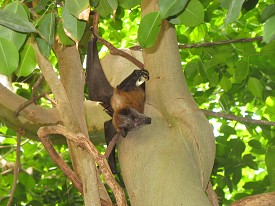Welcome Bats to Your Garden
 Bees, mason and otherwise, are among our favorite pollinators, but there's another group of pollinators out there that doesn't get nearly as much friendly press: bats.
Bees, mason and otherwise, are among our favorite pollinators, but there's another group of pollinators out there that doesn't get nearly as much friendly press: bats.
That's right! Far from being vampires in disguise, bats are actually a vital part of the natural ecosystem, and while you might not know it yet, you really want them in your garden. We're going to tell you why...and how to convince them to drop in and perhaps set up housekeeping in your neighborhood.
To begin with, bats are great natural pollinators. You might not see them, because they come out at night, but especially if you live in the tropics or near a desert region, bats are playing a big role in flowering, fruit setting, and more, as they move from plant to plant to feed, taking pollen along with them. Nectar-feeding bats love a good flower garden, and they'll be delighted to settle in where there's an ample food supply.
Other bat species eat small insects, which is good news for gardeners interested in natural pest control. Having problems with garden pests? Annoyed by bugs that come out at night to make sitting on your nice garden terrace positively unpleasant? You need some bats in the 'hood, because they'll take care of your problems for you! There's something really cool about seeing bats come out in the twilight hours, hovering around to hoover up dinner, and you'll experience some serious relief from stinging and biting insects in addition to garden pests.
Not sold on bats yet? Fair enough. How about this: they're also natural fertilizer machines. Bat guano has been prized for centuries as a form of high-grade entirely natural fertilizer, and in exchange for cozy digs in your garden, bats will be more than happy to provide you with some droppings. You can use guano on a variety of crops and ornamental plants to boost production and keep your garden healthy, beautiful, and resilient -- all without having to spend a dime on fertilizer (which, incidentally, may include guano if it's organic).
Incidentally, the myth that bats carry rabies is just that: a myth. The incidence of rabies is extremely low in the bat population, and the disease is highly fatal to bats, so any infected individuals tend to die long before they have contact with human beings and other animals. While some bat guano can carry fungi known to cause infections in humans, these animals don't carry much of a health risk other than that. You can protect yourself by wearing gloves when you work with guano, and a respirator or face protection if you're harvesting from a colony.
Bats are jacks of all trades, happily pollinating, clearing out unwanted insects, and fertilizing. Those are all great traits to have in garden visitors who don't ask for much in repayment. Curious about how to get bats to start hanging out around your neck of the woods?
Start by planting night-blooming flowers, like nicotiana, datura, and night-blooming jasmines. Lots of plants bloom at night and smell great, so they'll add another dimension to your garden, especially when the moon is out and you can wander through the garden to enjoy the sights and smells. Your nursery can help you pick out good night bloomers, and you can also order them through online plant suppliers.
In addition, put up some bat houses. Really basic bat houses are simple and easy to build, or you can pick them up relatively inexpensively from a hardware store, nursery, or bat enthusiast group. Some even provide bat houses for free as part of habitat restoration programs. If you want to encourage a larger colony, plans for bigger bat houses are available online. Bats need a cozy Chicago roof over their heads and a comfortable spot to nest, so your bat house will encourage them to visit and stay a while.
With bats around, you should start to notice an improvement around the garden -- and you won't have to shell out for Halloween decor next year!
Katie Marks writes for Networx.com.
Looking for a Pro? Call us (866) 441-6648

Landscaping Average Costs
Landscapers Experiences

“Stealth” Tree Trimming Was An Incredibly Clean Job

Lawn Repair: Contractor Followup To My DIY Prep Got The Job Done



